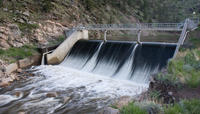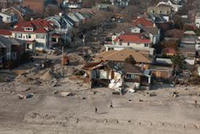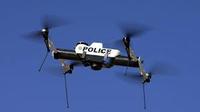-
Infrastructure renewal in regional Australia
New research in Australia calls for the establishment of a new national organization to tackle the shortfall in infrastructure investment and boost the regions’ capacity to contribute to national economic growth. Expert say the new organization, to be called Local Infrastructure Australia, would be the most effective way of overcoming the backlog in local government infrastructure investment now estimated at between $12 and $15.5 billion.
-
-
Legislation to require Internet privacy baseline not around the corner
The European Union has set tough privacy protection laws and is even considering a proposal which would set even stricter requirements on Internet companies, including allowing users to access and delete data collected on them. The United States, however, has very few privacy protection laws. Some argue this is a good thing.
-
-
Infrastructure sees drop in funding last year
Infrastructure investments in roads, bridges, and power stations have dropped significantly in 2012 as banks struggled to offer long-term debt and governments targeted cost savings. There were hopes that infrastructure spending would boost the world economy in 2012, but funding fell from $159 billion worldwide in 2011 to $99 billion.
-
-
Idaho debating nuclear waste storage
For two decades, the Yucca mountain nuclear waste repository in Nevada was viewed as a long-term solution to the growing problem of radioactive waste generated by the 104 active nuclear power generation plants in the United States. One of the Obama administration’s first acts was to “defund” the project, in effect outing an end to it. States such as Texas, New Mexico, and North Carolina have fashioned their own interim solution to the problem of nuclear waste storage, and the governor of Idaho wants his state to follow these states’ example.
-
-
Hydroelectric power generation superior to nuclear and coal, beats oil and gas

Researchers have reviewed the economic, social, and environmental impact of hydro, coal, oil, gas, and nuclear power. Each has its advantages and disadvantages, but of these conventional electricity generation technologies, hydroelectric power appears to be the most sustainable and acceptable environmentally and economically.
-
-
Old, faulty bores jeopardize Australia's water
Australian homes, towns, cities, farmers, and miners will rely increasingly on underground water as the country’s population grows, surface water supplies dwindle, and as droughts multiply under a warming climate. Trouble is, the authorities in charge do not have a clear idea exactly how much groundwater there is, how rapidly it is recharged — or how quickly it is being depleted. What is known is based on data largely supplied by 23,000 monitoring bores spread across the continent — more than two thirds of which are now falling into disrepair.
-
-
Salt Lake Community College to offer homeland security program
According to statistics from the U.S. Department of Labor, the need for emergency management professionals, protective service workers, and police and sheriff’s patrol officers is likely to increase more than 33 percent between 2011 and 2018. The Utah Board of Regents has approved the first Homeland Security and Emergency Management associate of applied degree in the state at Salt Lake Community College (SLCC).
-
-
NY to buy, demolish beachfront homes, make way for storm buffers

New York governor Andrew Cuomo plans to use $400 million in federal funding to buy beachfront homes as part of a broader plan to reshape the New York coastline so the state is better prepared for sea level rise, surges, and storms. The plan is to raze the purchased homes and leave to shore front vacant. Some properties would be turned into dunes, wetlands, or other natural buffers. Other parcels could be combined and turned into public parkland.
-
-
More states consider laws to limit the use of drones by police

The Federal Aviation Administration (FAA) appears ready to allow the use of drones in the United States, by both law enforcement agencies and private citizens, almost with no restrictions. Experts predict that by the end of the decade, there will be about 30,000 drones flying over the United States. Legislators in at least eleven states want to impose limits on the use of UAVs as worries grow that the unregulated use of drones would erode the liberties of Americans.
-
-
Massachusetts moves against unscrupulous compounding pharmas
State regulators in Massachusetts have shut down or cited thirty-two of the state’s forty compounding pharmacies as a result of a nationwide fungal meningitis outbreak. The outbreak killed forty-five people and sickened 696, who required hospitalization.
-
-
Miles tax may soon replace gas tax as a way to fund infrastructure maintenance
With infrastructure around the country in a state of disrepair, many states and lawmakers are trying to find a way to fund improvement of roads and bridges. The federal gasoline tax brings in fewer dollars each year, and now some lawmakers and transportation experts are considering the idea of taxing citizens by how far they drive each year instead of the amount of gasoline they buy each year.
-
-
Springfield, Illinois, faces infrastructure woes
As is the case with other cities, the infrastructure of Illinois’ capital, Springfield, is decaying. Experts told the city council that it would take $86.6 million over the next three years to shore up the city’s streets and sewer system, and $22.5 million a year thereafter to maintain it. The city is now grappling with how to raise the necessary funds.
-
-
New clean coal technology provides energy without burning
A new form of clean coal technology reached an important milestone recently, with the successful operation of a research-scale combustion system. The technology is now ready for testing at a larger scale. For 203 continuous hours, the combustion unit produced heat from coal while capturing 99 percent of the carbon dioxide produced in the reaction.
-
-
December, January the top two months in terms of gun purchases in U.S.
New figures released by the FBI show that Americans, during December and January, have been buying guns in record numbers. Analysts say that behind the surge in gun purchases are two events: the Newtown, Connecticut mass shooting and the moves by the Obama administration to introduce – and, in the case of assault weapons, reintroduce – gun control measures. The FBI figures show that in January, the agency performed 2,495,440 gun background checks, initiated by gun sellers before they sold a gun to a customer.
-
-
Labor unions join campaign for immigration reform
The immigration reform debate continues to grab the headlines, and labor unions are now entering the ring, hoping that organizing immigrant workers can boost the unions’ shrinking ranks.
-
More headlines
The long view
Factories First: Winning the Drone War Before It Starts
Wars are won by factories before they are won on the battlefield,Martin C. Feldmann writes, noting that the United States lacks the manufacturing depth for the coming drone age. Rectifying this situation “will take far more than procurement tweaks,” Feldmann writes. “It demands a national-level, wartime-scale industrial mobilization.”
Trump Is Fast-Tracking New Coal Mines — Even When They Don’t Make Economic Sense
In Appalachian Tennessee, mines shut down and couldn’t pay their debts. Now a new one is opening under the guise of an “energy emergency.”
Smaller Nuclear Reactors Spark Renewed Interest in a Once-Shunned Energy Source
In the past two years, half the states have taken action to promote nuclear power, from creating nuclear task forces to integrating nuclear into long-term energy plans.
